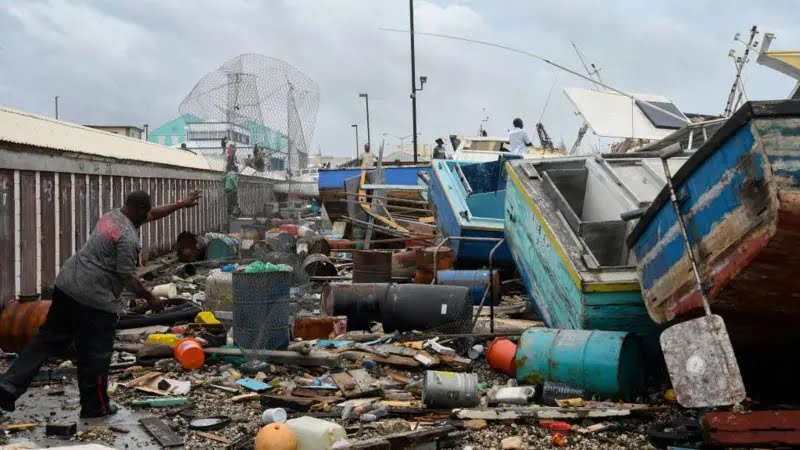
Beryl churns towards Jamaica, causing much havoc on its trail as it rips across the southeast Caribbean.
After striking the southeast Caribbean, where it killed at least six people and destroyed nearly 90% of the homes on one island in the Grenadines archipelago, Hurricane Beryl is now headed straight for Jamaica.
It was predicted that Beryl, the storm with the earliest recorded intensity to reach Category 5, the highest rating on the Saffir-Simpson Scale, might start to weaken on Tuesday night. On Wednesday, the storm is expected to travel close to or over Jamaica, and on Thursday, it is predicted to move close to the Cayman Islands, making it a Category 4 hurricane that is “very dangerous.”
With maximum winds of 150 mph (250 kmph) on Tuesday night, the storm was situated roughly 300 miles (480 km) east-southeast of Kingston, the capital of Jamaica. Local officials issued a warning to the population to stockpile supplies and protect their homes.
“I urge all Jamaicans to stock up on food, batteries, candles, and water. Secure your critical documents and remove any trees or items that could endanger your property,” Jamaican Prime Minister Andrew Holness said on X.
“Everyone, including those living alone, should take these necessary steps now. It’s better to be prepared than to regret not preparing.” he added.
According to the National Hurricane Centre (NHC) in the United States, Beryl appears to be headed straight towards Jamaica, where it will bring potentially hazardous winds, a lot of rain, and storm surges to the island nation.
The World Meteorological Organisation (WMO) stated that Beryl, the first hurricane of the Atlantic season, “sets an alarming precedent for what is expected to be a very active hurricane season.”
According to scientists, climate change both probably influenced Beryl’s early formation and accelerated its intensification. According to Christopher Rozoff, an atmospheric scientist at the National Centre for Atmospheric Research in the United States, global warming has contributed to the North Atlantic’s temperatures reaching record highs. According to him, the warmer waters cause more evaporation, which intensifies hurricanes with stronger winds.
Beryl jumped from a Category 1 to a Category 4 storm in under 10 hours, according to Andra Garner, a Rowan University meteorologist. That marked the fastest intensification ever recorded before September, the peak of the Atlantic hurricane season, she added.
Read more: https://thelocaljournalist.com/assam-floods-critical-kaziranga-impacted/
